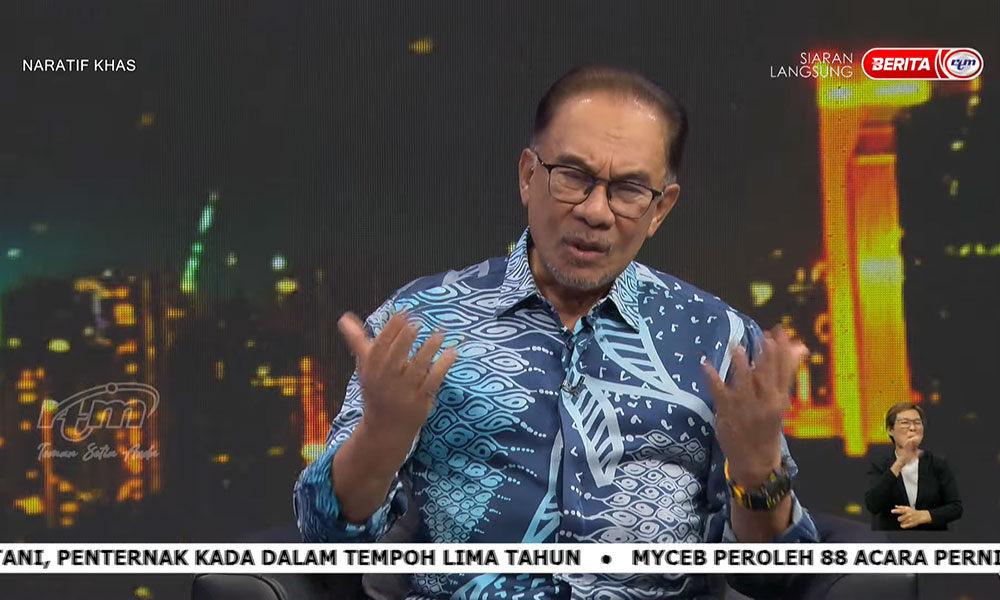
Industry cartels behind high cost of living, says PM
Prime Minister Anwar Ibrahim has blamed powerful industry cartels for causing the high cost of living in Malaysia, stressing that if they are not controlled, the people will continue to suffer.
“High cost of living, food security, unfair wages… these are all caused by the industry cartels who are continuously absorbing from the people every day.
“The farmers, the fisherfolks and the labour workers, they are victims of these cartels who make it impossible for them to earn an honest living,” Anwar said on RTM’s ‘Naratif Khas’ last night.
He said these cartels are too strong that stricter regulations should be instilled to stop them from “going out of control”.
The prime minister said this matter pushed the government to increase electricity tariffs for multinational corporations and not for households, small and medium enterprises and food and agricultural companies.
“It’s a small move but it’s the best start and soon, we might be implementing more subsidies for the people and not for the big corporations.
“When I came back in as the finance minister, I saw that the electricity tariffs reached RM30 billion and I knew I had to put a stop to that. So, we are cutting costs to save money for the country,” he added.
Minimum wage
As for wages, Anwar agreed that the minimum wage of RM1,500 is too low for any person and expressed disappointment towards employers who think the new minimum wage is “too high”.
He stated that they do not truly understand how difficult it is for the everyday Malaysian to afford basic necessities.
As for wages, Anwar agreed that the minimum wage of RM1,500 is too low for any person and expressed disappointment towards employers who think the new minimum wage is “too high”.
He stated that they do not truly understand how difficult it is for the everyday Malaysian to afford basic necessities.

Prime Minister Anwar Ibrahim
“They’ve never been in the shoes of poor people, how much do you think RM1,500 can cover a minimum wage worker in the city?
“Rent is expensive and so are prices of food, they cannot live comfortably with that amount monthly.
“Companies are rising, like buildings, but humanity is slowly being demolished. The government needs to keep pushing corporations to increase the wages for their employees because they deserve to be respected by their employers,” the prime minister concluded.
The new minimum wage of RM1,500 was officially gazetted on April 27 last year and was made effective three days later, issued under the Minimum Wages Order by former human resources minister M Saravanan.
According to the gazette, employers with fewer than five employees are excluded from the minimum wage of RM1,500 on May 1 where initially, the implementation would not happen until Jan 1 this year.
However, an extension was granted by the current Human Resources Minister V Sivakumar to July 1.
“They’ve never been in the shoes of poor people, how much do you think RM1,500 can cover a minimum wage worker in the city?
“Rent is expensive and so are prices of food, they cannot live comfortably with that amount monthly.
“Companies are rising, like buildings, but humanity is slowly being demolished. The government needs to keep pushing corporations to increase the wages for their employees because they deserve to be respected by their employers,” the prime minister concluded.
The new minimum wage of RM1,500 was officially gazetted on April 27 last year and was made effective three days later, issued under the Minimum Wages Order by former human resources minister M Saravanan.
According to the gazette, employers with fewer than five employees are excluded from the minimum wage of RM1,500 on May 1 where initially, the implementation would not happen until Jan 1 this year.
However, an extension was granted by the current Human Resources Minister V Sivakumar to July 1.
Apart from the MR60 mil that Bernas will distribute to rice farmers, what happens after that is unclear.
ReplyDeleteIs the monopoly by Bernas still intact? Anwar or Rafizi as Economics Minister has to set a long term solution to this monopoly issue.